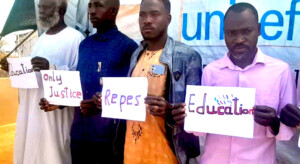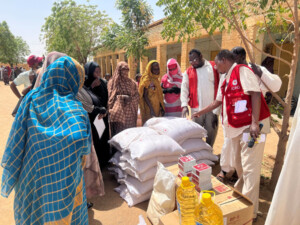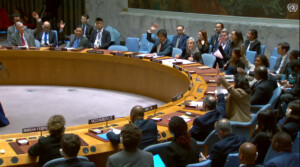Sudanese Doctors Syndicate calls for international support
The Sudanese medical profession has called on colleagues and organisations around the world for support, in a statement issued on Saturday.
 Doctors on strike, El Gedaref 26 Dec 2018 (RD)
Doctors on strike, El Gedaref 26 Dec 2018 (RD)
The Sudanese medical profession has called on colleagues and organisations around the world for support, in a statement issued on Saturday.
Members of various professional associations and trade unions have joined the call for these peaceful protests to object the unprecedented collapse of the public sector and the lack of public services provision in the public facilities.
“Doctors in particular have borne the brunt of a collapsed health system. As a matter of fact, doctors have gone into several general strikes over the past few years demanding improvement of the health system and doctors’ working conditions in Sudan. There has been a blatant policy of systematically destroying the once free national health services and transforming it into a profitable sector,” the statement says.
The out-of-pocket health expenditure exceeds 64 percent while the government allocated less than two per cent of its annual general budget for the public health sector. Even in the private sector, doctors struggle with scarcity, expense and sometimes the total lack of life-saving medicines. The impact of the rapid devaluation of the Sudanese currency and the general economic collapse has further limited medicine importation.
In addition, the local drugs and medical supplies industry remains meagre. Shortages in lifesaving medicines includes insulin, Syntocinon (Oxytocin), a long list of first- and second-line antibiotics, in addition to intravenous fluids, plasma expanders and oxygen delivery systems.
Medicines prices soar
The prices of the available medicines have increased by 150 per cent to 300 per cent on average due to inflation. As a result, Sudanese doctors have become unable to perform their duties of saving lives and of providing adequate care to their patient s, within the dwindling public fund allocated to the health sector and dilapidated hospitals. Our only option coupled by our professional duty was to escalate our protest, declare a strike as our demands for major healthcare changes have been repeatedly ignored over the years.
A remarkable moment during the ongoing protests was the march called for by the Sudanese Professionals Association on December 25, 2018. The government responded with the use of extreme force and firing live bullets at the peaceful protestors. According to the Human Rights Watch organisation, the death toll reached 37 in the first five days of protests. Majority were head and chest gunfire wounds. “Shoot to kill” intent. As doctors we expected the popular march to be faced with similar brutality from the government security forces. In the total absence of any sort of medical emergency or ambulance services willing to reach protestors in Khartoum, emergency field teams were voluntarily prepared by the Sudanese Doctors Syndicate and Central Committee of Doctors to provide both medical and financial aid to wounded protestors.
Security forces dealt with these medical teams as the enemy. Many doctors were detained whilst providing voluntary medical services to the many casualties, some of which were seriously wounded that day. Among them was doctor Sabir Mohamed Ahmed as surgical registrar was shot with a live bullet, that entered his left thigh and exited through the left he was rushed into an emergency surgery. Another victim that day was Hasan Omar, a 22 years-old 4th year medical student who was shot in the neck, the bullet went through trachea, oesophagus and transecting his spinal cord rendering him quadriplegic, he remains on ventilation on the intensive care to date.
Doctors in the private sector opened the doors of their hospitals to treat the wounded in the protests since that day and up to now free of charge, withstanding continuous staff harassment by security forces and attempts to detain some of the wounded protestors who were transferred there. Tear gas was released within the hospital vicinity with total disregard of patient and staff safety.
Doctors’ strike
As the doctors were the first of trade union workers to go on strike, a series of arrests ensued. Among the doctors who were detained that day and still in incommunicado detention are doctor Ahmed El Sheikh, head of the Sudan Doctors Syndicate, his deputy doctor Najib Najmeldin, doctor Ihsan Fegeiri, a senior member of the syndicate’s executive committee (and a leading women's rights activist) and Amal Jabrallah, a senior psychiatrist. The list of detained doctors also include Sayed El Khateeb, Howeida El Hasan, and Adiba El Sayed.
Most recently, doctor El Fatih Omar, member of the executive committee of the Doctors Syndicate and general manager of El Tuga private hospital in Omdurman, was arrested after announcing the hospital's commitment to treat all the injured protestors free of charge.
On January 4, Sudanese security forces arrested Dr Mohamed Naji El Asam who also represents the Central Doctors Committee in the secretariat of the Sudanese Professionals Association and there are grave concerns regarding his safety. Despite his youth (28), he became the first public spokesman for the Sudanese Professionals Association, following his video announcement of the Declaration of Change and Freedom published on the the Association's website on January 1. The major opposition political forces in the country swiftly joined this Declaration.
Assaults on doctors
Assaults on medical doctors at work have risen in the past few years; the majority perpetrated by police, army and security personnel, ranging from verbal abuse to grievous bodily harm. Several hospitals have been stormed by security forces, to arrest both doctors and wounded patients from emergency departments. The latest event took place in Omdurman Teaching Hospital on January 9, when security forces raided the hospital, fired tear gas and live bullets inside the hospital, and detained many of the doctors and patients who were receiving treatment after being injured in the peaceful march that took place in the same day.
The current situation makes it impossible for the Sudanese doctors to conduct their ethical and professional duties. Sudanese doctors demand nothing but to be able to conduct these duties and work in an environment that delivers up to standard healthcare. We are desperately in need now of a show solidarity as a means of international media pressure from colleagues and organisations from all around the world, the appeal concludes.









 and then
and then